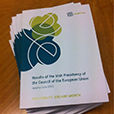EU Policy Overview
As a member of the European Union, Ireland plays its role in developing policies that affect not only Irish people but how the EU interacts with the rest of the world. EU policy can be broadly divided into internal (common) policies and external policies.
Internal policies
The internal policies of the EU are also known as common policies. They have a direct impact on EU citizens in every member state and cover issues such as:
- Agricultural policy
- Food safety
- Environment standards
External policies
External Policies are focused on political co-operation between member states on issues such as:
- Enlargement of the EU
- Aid and humanitarian assistance
- Trade and external relations with countries outside the EU
- Promotion of peace, democracy and stability beyond the EU's borders
Implementing policies
The three main EU Institutions - the Commission, the Council of the EU and the European Parliament - work together to create and approve EU policies. However, each institution has a different role.
European Commission
The European Commission represents the interests of the EU as a whole. It proposes new legislation to the Council and the Parliament and makes sure that EU law is correctly applied by member states.
Council of the European Union
The Council of the European Union is where our ministers represent Ireland. They come together with ministers from other member states to amend EU policy the Commission has proposed and to vote on these proposals.
European Parliament
Irish MEPs in the European Parliament represent the views and concerns of their constituents when policy proposals are being discussed within committees and during a Plenary sitting of the entire Parliament. The Parliament can also make amendments to policy proposals.

